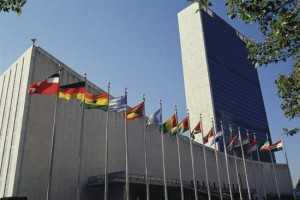 A chorus of delegates from around the world protested attempts to make “sexual orientation and gender identity” a protected category in international human rights law at the General Assembly last week.
A chorus of delegates from around the world protested attempts to make “sexual orientation and gender identity” a protected category in international human rights law at the General Assembly last week.
The Africa Group, composed of 54 countries, delivered a forceful statement to Joachim Rücker, the German president of the Human Rights Council, as he presented the annual report of the council to the General Assembly on Monday:
“The African Group reiterates its strong concern at attempts to impose new notions and concepts, such as sexual orientation and gender identity, that are not referenced in international human rights law and STRONGLY REJECTS [emphasis original]any attempt to undermine the international human rights system by seeking to impose concepts or notions pertaining to social matters, including private individual conduct, that fall outside the internationally agreed human rights framework.”
Rücker rejected suggestions that the council should be scrutinized and evaluated by the General Assembly, “While the Council is de jure a subsidiary body of the General Assembly, we trust that our decisions are respected and, in the form of our annual report, acknowledged in toto.”
The African states were not persuaded.
They said promoting special rights for individuals who identify as lesbian, gay, bisexual or transgender (LGBT) on the basis of their sexual preferences or behaviors was an “expression of disregard for the universality of human rights” and would only serve to “divide” UN member states. The group said these were “matters that fall essentially within the domestic jurisdiction of states,” citing Article 2 of the UN Charter.
Since the passage of the first resolution on sexual orientation and gender identity at the Human Rights Council in 2011 pressure on LGBT rights within the UN has increased exponentially, and countries are weary of it, especially at the General Assembly where such a resolution would inevitably fail.
The countries lamented how emphasizing LGBT rights was only “to the detriment of issues of paramount importance,” including the eradication of poverty and race discrimination. These views were echoed by Belarus which complained how it was being pressured on LGBT rights while a refugee and migrant crisis was unfolding in Europe.
Nigeria added that giving “priority to the rights of certain individuals” could result in “negative discrimination at the expense of internationally agreed rights, and run counter to the principles of non-discrimination and equality.”
Iran called for the UN human rights system to embrace its founding principles of “mutual respect for different values, traditions and cultures, and refrain from imposing a single lifestyle, and non-consensual concepts on the others.”
Egypt briefly summed up many of these concerns saying the promotion of LGBT rights had “no basis in international law” and undermines the “credibility of the international human rights system.”
Russia, Pakistan, Tanzania, and Sudan also shared similar concerns.
There has never been a consensus on LGBT rights in the General Assembly. The term is opposed by a growing number of states. Many countries where homosexuality is not socially acceptable will tolerate the promotion of homosexuality peripherally or stealthily through the UN bureaucracy, but not on issues of consequence that are subject to political scrutiny.
Although the Obama administration has trumpeted its success in advancing LGBT rights, the growing chorus against the bullhorn diplomacy is thrusting the issue into the political domain, where it is less likely to succeed.



